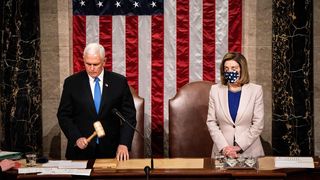Imagine if there was a prime minister who was a bitterly divisive figure but still commanded a majority of support in his caucus. Imagine this prime minister faced a vote of no confidence in the House of Representatives, which he was expected to lose. And imagine that he called his most fervent followers to Commonwealth Park, and said: "Something's wrong here. Something's really wrong. And we fight. And we fight like hell and if you don't fight like hell you're not going to have a country anymore. We will never give up. We will never concede."
Imagine that he urged his followers to take the protest to Parliament, days after tweeting: "Big protest in Canberra on January 6th. Be there. Will be wild!" Imagine that after the prime minister spoke, thousands of people marched down Commonwealth Avenue and up the ramp to Parliament's public entrance, stormed into the building, overpowered the security guards, went up the stairs, entered and trashed the Speaker's office, and pounded on the doors of the House chamber itself.
I worked in the US Congress for 10 years and was in the Capitol building most days. An assault on Congress by my fellow Americans was simply unimaginable.
Imagine that they stopped the proceedings inside, deterred only by armed security with guns pointed at those doors lest the mob break in. Imagine a woman was shot and later died.
Unimaginable, yes?
I worked in the US Congress for 10 years and was in the Capitol building most days. An assault on Congress by my fellow Americans was simply unimaginable. Congress has been through scares before in our lifetimes, most notably the lockdown on 9/11 when a plane hijacked by terrorists was on course to crash into the building, destroying the most recognised symbol of democracy in the world. Because the passengers on United Airlines Flight 93 stormed the cockpit, the plane crashed in Pennsylvania, and that particular terror was avoided.
But there has been nothing like the attack of 1/6.
Which is why President-elect Joe Biden said: "Yesterday, in my view, was one of the darkest days in the history of our nation. An unprecedented assault on our nation."
The mob, incited by President Trump, succeeded in interrupting the process ordained by the US constitution in which the final Electoral College votes of the presidential election are opened and counted, affirming the next president - enshrining once again, as has occurred in every US election since 1796, the peaceful transfer of power.
But the mob did not overthrow the Congress or prevent the fulfilment of its constitutional responsibility to complete the Electoral College vote count. The first reaction of the leaders and members of Congress across both parties after the initial shock of these events was to reconvene on the same day and finish the business pursuant to the constitution.
"To those who wreaked havoc in our Capitol today, you did not win," Vice-President Pence said when Congress reconvened. "Violence never wins. Freedom wins. And this is still the people's house."
So the day ended with the republic more than intact.
The intent of the attack on Congress was to prevent Congress from affirming Joe Biden's election victory in several key states - overriding the votes of American citizens. This is simply unprecedented, contrary to law and the US constitution. Trump and his allies' lawyers lost their wild arguments 60 times in courts across the county, and three times in the Supreme Court.
The two most powerful Republicans below Trump, Pence and Senate Republican leader Mitch McConnell, broke with Trump on this fundamental issue. They refused to legitimise any nullification of the people's votes.
The two most powerful Republicans below Trump, Pence and Senate Republican leader Mitch McConnell, broke with Trump on this fundamental issue. They refused to legitimise any nullification of the people's votes.
"I'm finishing 36 years in the Senate and I've cast a lot of big votes," including over war and impeachment, McConnell said. "And in my view, just my view, this will be the most consequential I have ever cast."
And it was. At 3.40 am on January 7 in Washington, Congress completed its work. Vice-President Pence announced that Joe Biden and Kamala Harris - and not Trump and himself - had won a majority of the Electoral College votes and would be sworn in on January 20.
But the attack sparked by Trump remains terrifying. The third-ranking Republican in the House, Rep. Liz Cheney, daughter of former vice-president Dick Cheney, said: "There is no question the President formed the mob. The President incited the mob. The President addressed the mob. He lit the flame."
After Congress completed its work, and again yesterday, Trump said he is committed to an orderly transition on January 20, but conceded nothing in terms of recognising the legitimacy of Biden's victory.
But virtually all Democrats in Congress, and many Republicans, including several who are resigning from the executive branch, believe it is too dangerous for Trump to continue in office, even for just the last 12 days of his presidency. This is why Speaker Nancy Pelosi said: "The president of the United States incited an armed insurrection against America. In calling for this seditious act, the President has committed an unspeakable assault on our nation and our people." She added that Trump is "a very dangerous person who should not continue in office. This is urgent. This is urgency of the highest magnitude."
There is great instability in the Oval Office, and concern over Trump's state of mind and what he still could do, even as his presidency dissolves. In his final days, Trump faces yet a further reckoning of being removed from office via the 25th amendment, in which the vice-president can become the acting president, or via impeachment. Because of what was unimaginable, the House could vote to impeach Trump for a second time in the next few days.






